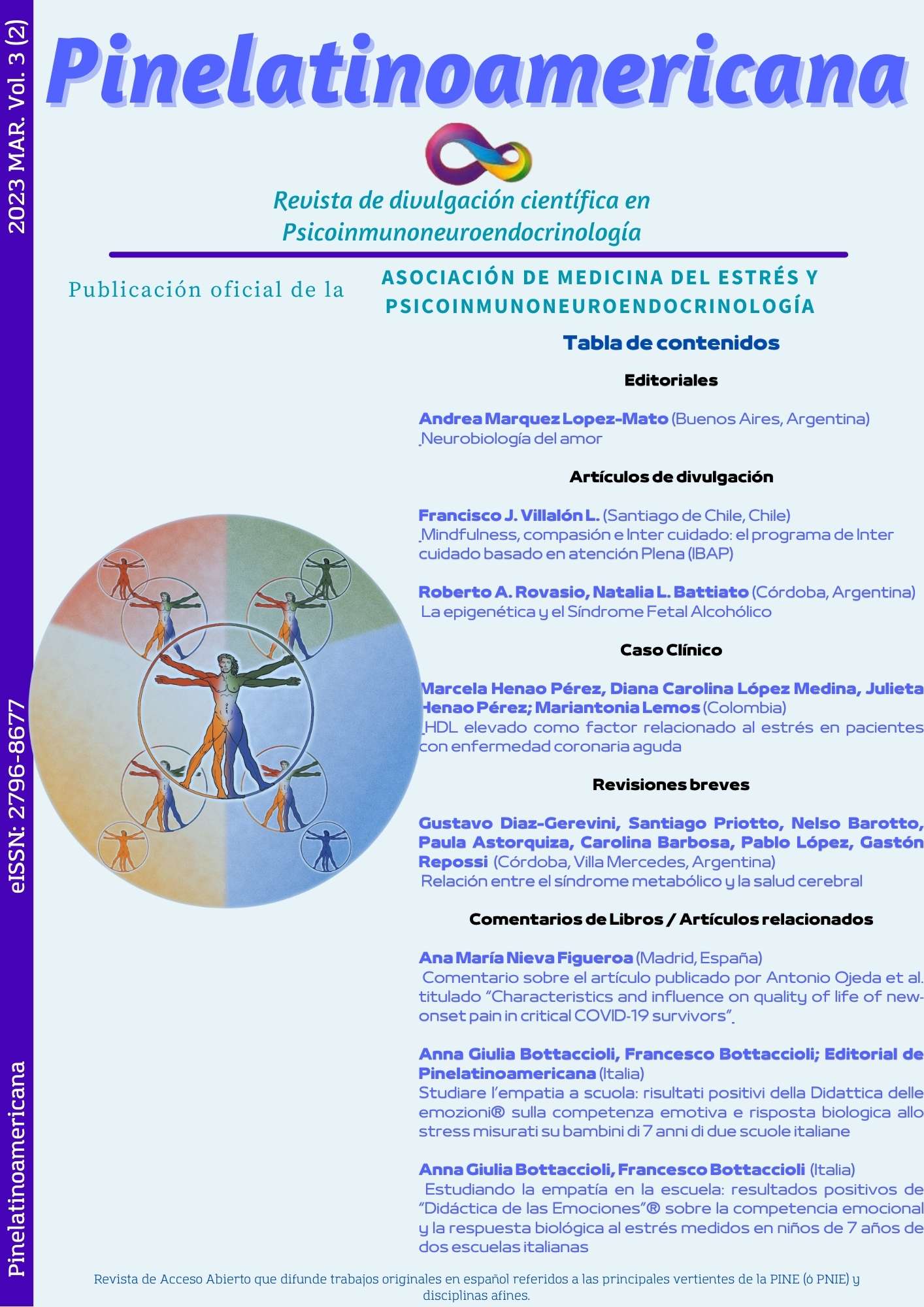Resumo
A prática da atenção plena e compaixão tem demonstrado ser efetiva tanto no bem-estar emocional e mental, bem como no manejo de diversas condições psicológicas e físicas. No entanto, sua difusão tem levado a críticas e controvérsias relacionadas à falta de uniformidade na implementação da prática, às competências mínimas necessárias e à instrumentalização de seu componente ético/espiritual. Além disso, tem sido observado que fatores comuns, como a aliança terapêutica e o senso de pertencimento do grupo, são ainda mais importantes na efetividade da intervenção. Também é destacada a necessidade de programas adaptados culturalmente e mais acessíveis. Para enfrentar essas dificuldades, foi desenvolvido o programa de Intercuidado baseado em atenção plena e compaixão (IBAP), que inclui a integração do componente ético/espiritual e a promoção do senso de pertencimento do grupo. O programa é modular, adaptável a diferentes populações e está disponível para a América Latina. Ele demonstrou benefícios no bem-estar emocional e mental em estudos controlados randomizados. Em conjunto, essas propostas buscam promover a prática da atenção plena e compaixão de forma mais efetiva e acessível, levando em consideração a diversidade cultural e as necessidades de cada comunidade.
Referências
Allen, K.-A., Kern, M. L., Rozek, C. S., McInerney, D. M., y Slavich, G. M. (2021). Belonging: A review of conceptual issues, an integrative framework, and directions for future research. Australian Journal of Psychology, 73(1), 87-102. https://doi.org/10.1080/00049530.2021.1883409
Captari, L. E., Hook, J. N., Hoyt, W., Davis, D. E., McElroy-Heltzel, S. E., y Worthington, E. L. (2018). Integrating clients’ religion and spirituality within psychotherapy: A comprehensive meta-analysis. Journal of Clinical Psychology, 74(11), 1938-1951. https://doi.org/10.1002/jclp.22681
Dunning, D., Ahmed, S., Foulkes, L., Griffin, C., Griffiths, K., Leung, J. T., Parker, J., Piera Pi-Sunyer, B., Sakhardande, A., Bennett, M., Haag, C., Montero-Marin, J., Packman, D., Vainre, M., Watson, P., MYRIAD Team, Kuyken, W., Williams, J. M. G., Ukoumunne, O. C., Blakemore, S. J., … MYRIAD Team Group (2022). The impact of mindfulness training in early adolescence on affective executive control, and on later mental health during the COVID-19 pandemic: a randomised controlled trial. Evidence-based mental health, 25(3), 110–116. Advance online publication. https://doi.org/10.1136/ebmental-2022-300460
Gillath, O., Karantzas, G. C., Romano, D., y Karantzas, K. M. (2022). Attachment Security Priming: A Meta-Analysis. Personality and social psychology review: an official journal of the Society for Personality and Social Psychology, Inc, 26(3), 183–241. https://doi.org/10.1177/10888683211054592
Goldberg S. B. (2022). A common factors perspective on mindfulness-based interventions. Nature reviews psychology, 1(10), 605–619. https://doi.org/10.1038/s44159-022-00090-8
Hathaway, W. L., y Ripley, J. S. (2009). Ethical concerns around spirituality and religion in clinical practice. In J. D. Aten & M. M. Leach (Eds.), Spirituality and the therapeutic process: A comprehensive resource from intake to termination (pp. 25–52). American Psychological Association. https://doi.org/10.1037/11853-002
Krägeloh, C. U. (2016). Importance of Morality in Mindfulness Practice. Counseling and Values, 61(1), 97-110. https://doi.org/10.1002/cvj.12028
Luberto, C. M., Shinday, N., Song, R., Philpotts, L. L., Park, E. R., Fricchione, G. L., y Yeh, G. Y. (2018). A Systematic Review and Meta-analysis of the Effects of Meditation on Empathy, Compassion, and Prosocial Behaviors. Mindfulness, 9(3), 708–724. https://doi.org/10.1007/s12671-017-0841-8
Matko, K., Sedlmeier, P., y Bringmann, H. C. (2022). Embodied Cognition in Meditation, Yoga, and Ethics-An Experimental Single-Case Study on the Differential Effects of Four Mind-Body Treatments. International journal of environmental research and public health, 19(18), 11734. https://doi.org/10.3390/ijerph191811734
Mortari, L. (2019). Filosofia del Cuidado (1ra ed.). Editorial Universidad del Desarrollo.
Pargament, K. I., Exline, J. J., y Jones, J. W. (2013). APA handbook of psychology, religion, and spirituality (Vol 1): Context, theory, and research (pp. xxvii, 740). American Psychological Association. https://doi.org/10.1037/14045-000
Patterson, C. H. (2004). Do We Need Multicultural Counseling Competencies? Journal of Mental Health Counseling, 26(1), 67-73. https://doi.org/10.17744/mehc.26.1.j7x0nguc7hjh545u
Priebe, S., Conneely, M., McCabe, R., y Bird, V. (2019). What can clinicians do to improve outcomes across psychiatric treatments: a conceptual review of non-specific components. Epidemiology and psychiatric sciences, 29, e48. https://doi.org/10.1017/S2045796019000428
Schumer, M. C., Lindsay, E. K., y Creswell, J. D. (2018). Brief mindfulness training for negative affectivity: A systematic review and meta-analysis. Journal of consulting and clinical psychology, 86(7), 569–583. https://doi.org/10.1037/ccp0000324
Van Dam, N. T., van Vugt, M. K., Vago, D. R., Schmalzl, L., Saron, C. D., Olendzki, A., Meissner, T., Lazar, S. W., Kerr, C. E., Gorchov, J., Fox, K. C. R., Field, B. A., Britton, W. B., Brefczynski-Lewis, J. A., y Meyer, D. E. (2018). Mind the Hype: A Critical Evaluation and Prescriptive Agenda for Research on Mindfulness and Meditation. Perspectives on Psychological Science, 13(1), 36-61. https://doi.org/10.1177/1745691617709589
Villalón, L. F. J., Correa, M. E. y Cabieses, B. (2020). Intervención basada en mindfulness y pintura para cuidadores de niños y adolescentes con necesidades especiales: Un estudio piloto. Revista Archivos en Medicina Familiar, 22(2):61-71. https://www.medigraphic.com/cgi-bin/new/resumen.cgi?IDARTICULO=90975
Villalón L. F. J. (2023). Mindfulness, compasión e intercuidado: su marco conceptual. Pinelatinoamericana, 3(1), 42–53. https://revistas.unc.edu.ar/index.php/pinelatam/article/view/40756
Villalón, F. y Moreno, I. (2021, agosto 29). Curricular, Mindfulness, psychoeducational interventions for Mental Health and wellbeing in medical students during COVID-19 pandemic: Preliminary Results. AMEE Conference.
Villalón, F., Serrano, P., Rocuant, A., y Bertoglio, V. (2022, noviembre 10). Intervención online de inter-cuidado basada en mindfulness para reducir burnout en médicos durante la pandemia por COVID19: Resultados preliminares de un estudio clínico randomizado. LXXVII Congreso Sociedad Chilena de Neurología Psiquiatría y Neurocirugía, Chile.
Villalón F. J., Moreno M. I., Rivera, R., Venegas, W., Arancibia J. V., Soto A, y Pemjean, A. (2023). Brief online mindfulness and compassion based inter-care program for students during COVID19 pandemic: A randomized controlled trial. Mindfulness, [en prensa].
Zacca-González, G., Chinchilla-Rodríguez, Z., Vargas-Quesada, B., y de Moya-Anegón, F. (2014). Bibliometric analysis of regional Latin America's scientific output in Public Health through SCImago Journal & Country Rank. BMC public health, 14, 632. https://doi.org/10.1186/1471-2458-14-632

Este trabalho está licenciado sob uma licença Creative Commons Attribution-NonCommercial 4.0 International License.
Copyright (c) 2023 Pinelatinoamericana

